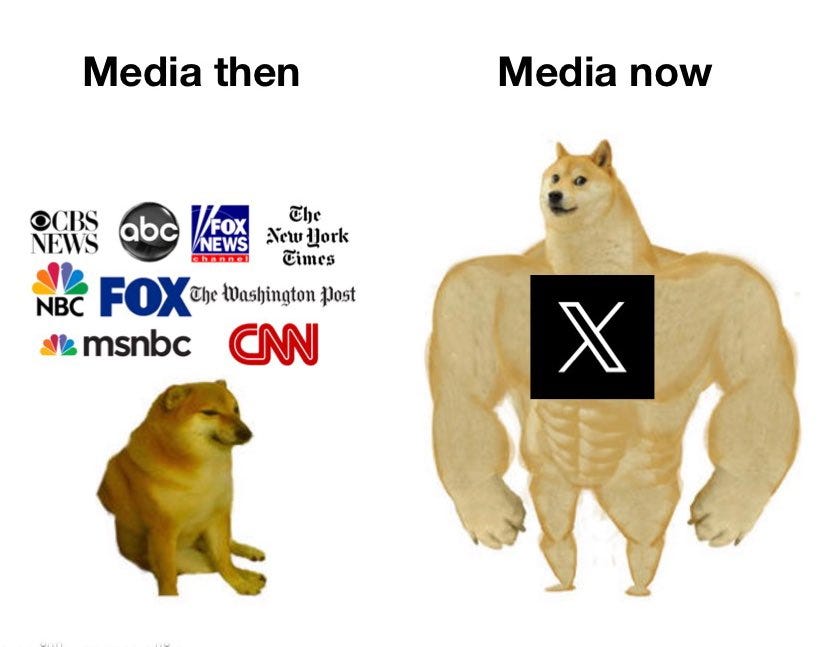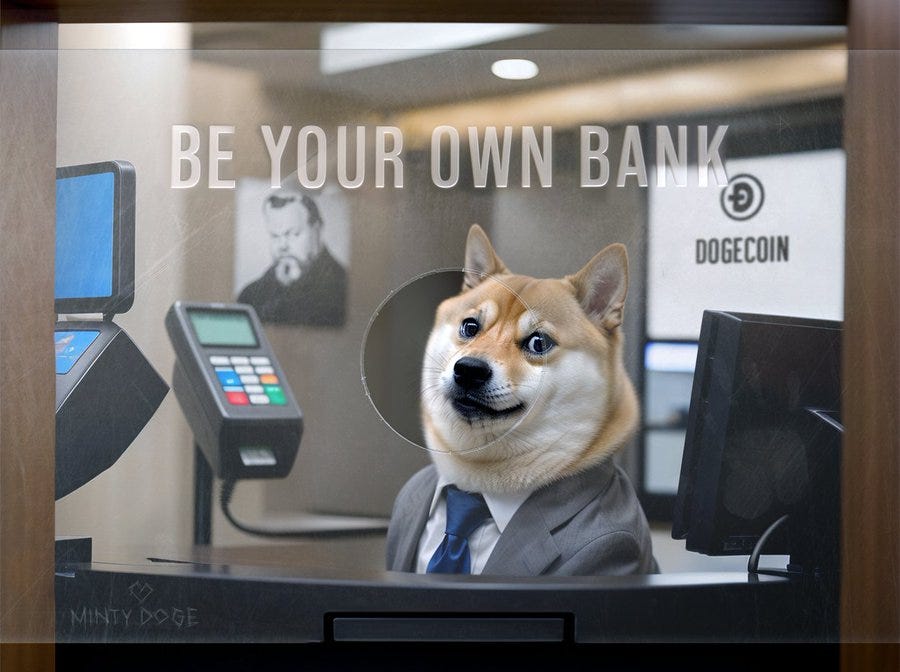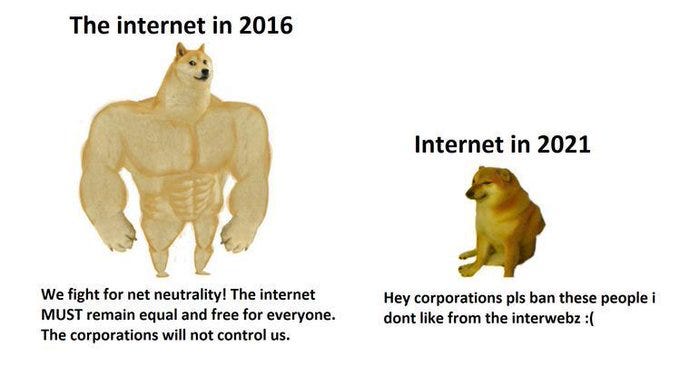Doge Is The Heartbeat of the Free Internet
Censorship Is Killing the Web, But Doge Will Bring It Back to Life
Hey everyone,
Last week, the public discussion on Internet censorship took a massive leap forward when former State Department employee Mike Benz appeared on Tucker.
Benz explained how a regime of Internet censorship grew over the last decade using AI-powered “Weapons of Mass Deletion” to control public opinion
Let’s take a look at why censorship is killing the Internet, and how Dogecoin can bring it back to life.
Thanks for reading Risky Reads: The People’s News for the People’s Coin—𝕏’s leading open-source newspaper.
If you enjoy this newsletter, consider subscribing for bonus content on 𝕏. Subscribers receive exclusive commentary on crypto, AI, and the online memescape. Sign up via my profile today!
I. Benz Sets 𝕏 Ablaze
Last Friday, a new Tucker interview about Internet censorship set 𝕏 on fire.
Mike Benz is founder of Foundation for Freedom Online. FFO describes itself as “a free speech watchdog dedicated to restoring the promise of a free and open Internet.” Before founding FFO, Benz worked for the US State Department.
Over the last year, he has built his account on 𝕏 by offering a uniquely detailed perspective on Internet censorship.
Benz told Tucker that the US military industrial complex uses the Internet a propaganda and censorship tool to carry out regime change operations in other countries, like the Arab Spring of 2011.
Now, he says, these weapons of narrative control have been turned on US citizens.
Benz’s interview with Tucker received rave reviews on its way to gaining 30 million impressions.
RFK Jr called the interview “One of the most remarkable interviews ever.” Journalist Simon Ateba said it was “the most shocking Tucker Carlson interview that I have watched.” Cartoonist Scott Adams claimed it was “the most extraordinary thing I have ever seen” and “like a mushroom trip without the mushrooms.”
Elon reposted the interview with the comment “Free speech is the bedrock of democracy. That’s why it’s the FIRST Amendment. Without free speech, all is lost.”
In another post, he wrote, “The public still doesn’t understand even a tiny fraction of the power of the censorship government-industrial complex.”
The interview picks up where the story of the Twitter Files left off, contextualizing the secret FBI/CIA campaign against free speech at Twitter as part of a larger censorship project that spans the past decade.
Benz argues that everything changed in 2016, the year of Brexit and Trump’s victory.
It was then that the international security state realized other Brexit-copycat populist movements were likely to spring up across Europe by way of social media.
These movements would inevitably demand that their governments close borders, curtail spending, and use resources to improve life at home rather than fund the endless parade of foreign wars that has become the hallmark of Western empire.
The international security state, Benz says, took control of the Internet to stymie a global populist uprising.
Had the Internet not come under a regime of censorship, a wave of nationalism would’ve swept across the world. Spexit (Spain), Grecxit (Greece), Frexit (France), and Gexit (Germany) would’ve followed close on Brexit’s heels, ultimately leading to the breakup of the European Union and NATO.
Benz backs his claims with encyclopedic detail about the censorship industrial complex.
During his interview with Tucker, he focused on the Atlantic Council, known as NATO’s think tank, which coordinated the use of AI-based censorship technologies.
These “Weapons of Mass Deletion” use machine learning to map out the discourse on controversial topics like Covid, elections, immigration, or war, classifying ideas as permissible or forbidden. T censor tens of millions of posts with just a few lines of code.
No one described the internal mechanics of online censorship quite like Benz, but awareness of the Internet’s artificiality has been building for a while.
In 2021, some users coined the term “Dead Internet Theory” to describe pattern in which authentic human expression was removed from the Internet and replaced with bland, astro-turfed, AI-generated content.
Here’s what folks think is going on…
II. How the Internet Died
Revelations about censorship from Benz’s interview align with a popular meme from 2021 called Dead Internet Theory.
Dead Internet Theory argues that the combination of censorship and AI have made the web sterile and bland, with alarmingly few signs of authentic human interaction.
The Internet of the present stands in contrast to the early web, which was notable for its embrace of free expression and authenticity.
Back then, the Internet’s anonymity allowed weirdness to flourish in a way that it could never do IRL, leading to a distinctly online counterculture.
Today’s Internet, by contrast, is something like the show Westworld: an amusement park inhabited by a handful of humans and and endless stream of humanoid robots.
What was once the Wild West has become a collection of digitally manicured walled gardens. The entire experience is engineered to tickle users’ dopamine sensors and produce passive gratification with maximum efficiency.
In this way, the modern web replicates the homogenized commercialism of television, with apps replacing channels and astroturfed influencers taking the place of traditional celebrities.
The combination of censorship and AI bot swarms mean the Dead Internet works like a trick mirror.
People think they exist in potential communication with all of humanity, but the reality is more confined: social media users are placed in a digital “room” that curbs their interaction to a small subset of other users.
Most users can see influencers and large accounts, but are limited to interacting with a handful of other small accounts in their immediate digital proximity.
The result is that information doesn’t spread organically and virally as it should, from one regular person to another. Instead, it must pass through the bottleneck of influencers if it’s going to be seen by large numbers of people.
Like celebrities, most influencers are limited in what they’re willing to say publicly, because their livelihood depends on approval from gatekeepers and algorithms.
Someone like Elon, who speaks his mind and routinely violates the official narrative, is the exception, not the rule.
The great hope for Elon’s 2022 Twitter purchase was that deceptive activities like shadow-banning and bot swarming would be eliminated altogether. In practice, deception has proven more difficult to uproot.
Censorship can still happen at the level of Internet infrastructure, which is controlled by international megacorps and their government sponsors. Bots have less influence on 𝕏 than they used to, but remain part of the experience.
Absent a totally new Internet infrastructure—something like StarLink—it will probably be difficult to roll back manipulation entirely.

Still, the degree of improvement in just the last year should not be understated.
𝕏 is more alive than any other social media platform on the Internet. Real people are flocking to the site because of its reputation for upholding free speech, leading to perpetually new highs in verified user activity.
The Overton Window has been getting noticeably wider each week as a result of open debate on otherwise forbidden topics like DEI, immigration, the American war machine, and medical freedom. Other platforms—none of which have come clean about censorship or bot activity—are being forced to allow content they’d previously banned just to stay relevant.
The pace of change at 𝕏 appears calculated to minimize social disruptions that the transition to a truly open Internet might cause if it were to happen too quickly.
Rather than unleash a tidal wave of online populism and controversial content across the web all at once, 𝕏 has been incrementally loosening the reins of its content moderation while simultaneously dragging old censorship schemes into light for the public to digest.
Even 𝕏’s relatively mild changes to content moderation have produced massive pushback in the form of advertiser boycotts, a lawfare campaign against Elon, and a constant stream of negative coverage from the legacy press, a sign of how much the security state values the Internet as a tool of social control.
The Internet is coming back to life, but slowly, in a way that preserves rather than overthrows civilization.
But what does all this have to do with Dogecoin?
III. Doge Is the Heartbeat of the Free Internet
The reality of censorship and the Dead Internet is important for the Dogecoin community to grapple with.
Elon famously dubbed Dogecoin “the people’s crypto.” Intentionally or not, that moniker put it on a parallel track with other online populist movements.
Doge is unique among populist crusades because it offers an alternative monetary system.
While other forms of populism acquire political control and use it as a lever to shape the economy, Dogecoin cuts straight to the chase by offering a sound-money, people-controlled alternative to legacy finance.
As Benz argues in his interview, censorship is carried out for the benefit of global financial institutions like the International Monetary Fund and World Bank, which use the dollar as a weapon to pillage natural resources from developing countries. These institutions stand to lose the most if online populism—and Dogecoin—comes into style.
Even if it does, governments will still control money printer. One of the most powerful things an individual can do is to opt out of government money system altogether, and Dogecoin offers a path to doing so today as a form of peaceful protest.
So with all the talk of AI censorship and deception, it’s reasonable to ask: is Dogecoin being censored?
On 𝕏, $DOGE and #Dogecoin do sometimes trend with tens or even hundreds of thousands of posts.
However, closer examination of these trending topics usually reveals a few dozen authentic posts. There’s scant evidence of 10k+ unique individuals discussing Dogecoin with each other at a given moment.
These numbers might reflect bot activity, or it could be that there is a high level of authentic activity that’s somehow being made invisible. Either way, someone’s finger is on the scale.
Another piece of the puzzle is Elon himself.
With Elon’s 170+ million followers, you might think his support for a cryptocurrency based on a viral meme would lead Dogecoin to exist in a state of more or less constant virality and cause demand far outstrip supply.
That’s what seemed to be happening in early 2021, when he was regularly posting his support for Doge.
Paradoxically, something changed during Elon’s May 2021 SNL appearance, at precisely the moment that Dogecoin surfaced into the mainstream.
Since that night, Doge has been seemingly pushed back underground, and its price has yet to surpass its apex.
Today, it’s possible that Doge discourse is somehow confined to a digital “room” with one-way mirror—we can see out, but the rest of the world can’t see in.
In this way, being part of the Dogecoin community on 𝕏 might be akin to membership in a secret society that’s otherwise invisible to the outside world—the Dogeluminati, if you will.
Every now and then, Dogecoin bursts through the nets of censorship to briefly penetrate mainstream consciousness, like when Elon wore a Doge shirt to the 2023 Super Bowl, or changed the Twitter bird into a Doge.
But so far, Dogecoin has yet to decisively break above the surface into mainstream awareness. It’s a matter of fascination and speculation what will cause it to do so, and when.
For the moment, Dogecoin appears to be a casualty of Weapons of Mass Deletion.
When it inevitably makes its return to the online battlefield, it could herald a larger renaissance for the Internet itself, in which commerce, virality, and speech are all unshackled at once.
The Internet might be on life support, but Dogecoin—and all that it represents—is its beating heart, and it beats for the people of the web everywhere.
Dogey Treats: News Bites
Ferrari announced it will accept Dogecoin and other cryptos as payment for cars.
A number of prominent Bitcoiners acknowledged that Bitcoin is not a popular Medium of Exchange.
Memes of the Week
Thank You!
Thanks for reading! Consider sending a tip or Subscribing on 𝕏 to help keep the newsletter going!
DJ2zTEdHBD3guHLfVaNBaypr6bHFG5Nwfw
It’s ALL Risky!
Thank you, kind reader, for reading and subscribing to this newsletter. I really appreciate it!
If you haven’t already, please sign up to this email newsletter for more weekly articles like this one. Also, please share it with a friend or on 𝕏 if you enjoyed this article.
What do you think? What was the biggest development for Doge this week? Let me know!
Remember, Dogecoin is risky. But then again, it’s all risky!
Follow on 𝕏 at @itsALLrisky
Send an email to itsALLrisky@gmail.com
Send a Doge tip: DJ2zTEdHBD3guHLfVaNBaypr6bHFG5Nwfw
This article was written in collaboration with @CryptoDogDivine, give them a follow!
Don't forget to subscribe to this newsletter!
Disclaimer: This is not financial advice and I am not a financial advisor. The article above references an opinion for entertainment purposes only and it is not investment advice. Always assume that the author of the article is actively trading and that the opinions expressed may be biased towards the author’s holdings. Do your own research and consult with a licensed financial adviser before making any investment decision. Do not treat any opinion expressed in this newsletter as a specific inducement to make a particular investment. Content, news, research, tools, and securities symbols are for educational and illustrative purposes only and do not imply a recommendation or solicitation to buy or sell a particular security or cryptocurrency or to engage in any particular investment strategy. The information provided is not warranted as to completeness or accuracy and is subject to change without notice. The projections or other information regarding the likelihood of various investment outcomes are hypothetical in nature, are not guaranteed for accuracy or completeness, do not reflect actual investment results and are not guarantees of future results. All investments involve risk, losses may exceed the principal invested, and the past performance of a security, industry, sector, market, cryptocurrency, or financial product does not guarantee future results or returns. Dogecoin is a speculative and highly volatile asset susceptible to pump-and-dump schemes.
At the time of publication, Dogecoin is around $0.09 per coin.

































